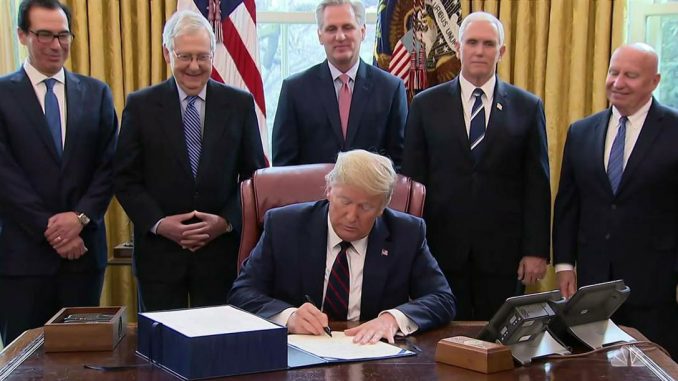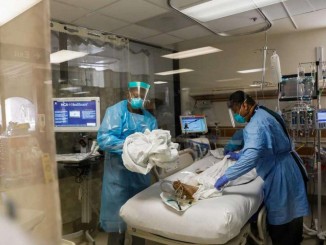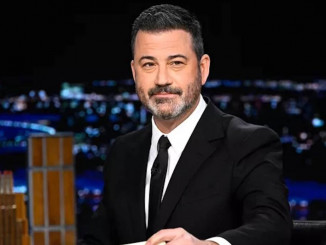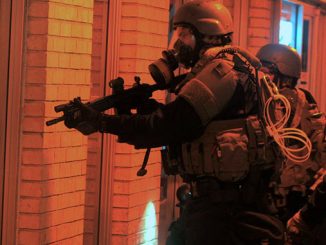
The first case of COVID-19 was confirmed in the U.S. on January 20, but statewide stay-at-home orders didn’t even start unrolling until March 19. For two months this highly contagious virus had been circulating throughout the country with practically no response. It is no surprise the U.S. has more cases than anywhere in the world, with 300,000 cases and over 8,000 deaths – already more than doubling the 2,977 death toll from September 11, 2001 attacks.
Since then, we’ve seen millions of workers thrown out of work – with an estimated 10 million people filing for unemployment in the last two weeks, shattering all previous records. We’ve seen lines of cars for the food bank stretch over a mile long. We’ve seen dairy farmers dumping thousands of gallons of milk just to keep the prices from falling. We’ve seen those of us who are still working having to put our lives at risk. We’ve seen healthcare workers take care of sick patients without protective equipment. We’ve seen hospitals completely overrun in New York and Louisiana, and hospitals everywhere already in desperate need of supplies to treat the sick. We’ve seen workers face retaliation for speaking up about unsafe conditions. Some have even been fired for wearing their own protective masks to work.
And what’s been the government’s response? On March 27, Congress passed a $2 trillion stimulus bill, later signed into law by Trump. The government has rushed in to the rescue – not of the working people who need it most, but of banks and corporations. This bill received unanimous bipartisan support, a clear reminder that Democrats and Republicans know how to come together when it comes to protecting their corporations and banks. They’ve made it very clear whose interests matter most in this society.
Included in the bill is an immediate $500 billion to go to the biggest corporations in the U.S., with little restriction on how the money is spent. This is in addition to $58 billion to the airline companies. But in addition to the $500 billion, corporations can then use this money to take out even bigger loans from the government, amounting to as much as 4 to 8 trillion dollars. In other words, the transfer of wealth to many of the largest corporations in the world could be over five times the amount of the money going to hospitals, states and working people from this stimulus bill.
The stimulus bill also gives the Federal Reserve the power to hold its meetings in secret without having to comply with Freedom-of-Information-Act requests. This was only included in the bill to allow the government to funnel even more money to banks and corporations without having to disclose information to the public.
Politicians and CEOs like to claim that a handout to their banks and corporations will help working people in the long run. But it never does. In 2008, Wall Street got the biggest bailout in history, and what followed was record profits for corporations without any real recovery for working people. Most new jobs that came back were part-time and temporary jobs, paying low wages. Whenever we see tax cuts to corporations and the super-rich – like the 1.5 trillion-dollar tax cut under Trump in 2017 – working people still experience wage cuts, reduced benefits, and continued job insecurity. We never see a dime from their handouts. In fact, even as the bailout for United Airlines was being signed, executives were still telling their workers to expect layoffs.
The stimulus does provide some needed relief. It promises to send $1,200 to most U.S. residents and an additional $500 per child. The bill also gives an incentive for small businesses to keep workers on the payroll and gives a $600 boost to state unemployment benefits for four months. It includes $100 billion for hospitals, $30 billion for schools, $25 billion for food assistance, and $24 billion for farmers.
It’s something, but it’s not nearly enough. For example, the bill provides no protection for renters. Some states have passed temporary moratoriums on evictions. But once the moratorium is lifted and millions of renters can’t pay their back rent, landlords will do everything they can to start throwing people out. Some of this stimulus money could have been used to eliminate that back rent.
And what about safety for the workers in health care, shipping, grocery, transportation and other industries who are still risking their lives? Workers in these industries are at greater risk of being infected. But while workers are dealing with unsafe conditions and devastating shortages of protective equipment, many workers have been retaliated against or even fired by management for standing up to unsafe conditions. Health care workers have even been threatened with termination just for bringing masks from home. Instead of being provided with what they need, workers are being singled out for demanding it. Workers shouldn’t have to work sick and risk their lives.
And as many hospitals are already overrun or soon could be, the federal government is allowing states to get tied up in a bidding war for ventilators. Hospitals should be supplied with whatever machines and protection they need. There’s obviously plenty of money to pay for it.
While large hotel chains stand to get millions of dollars from this stimulus, most of the homeless have been left on the streets. In Las Vegas, as thousands of rooms sit empty, the city government forced the homeless onto concrete parking lots with chalked off plots separated by six feet. There’s no roof, no separation. This is criminal.
The U.S. is the biggest jailer in the world, with an estimated 2.3 million people incarcerated. And now there have been increasing COVID-19 outbreaks inside prisons and immigrant detention centers. More than 160 inmates and 130 staff members at the Rikers Island jail have been infected with the virus, where 800 inmates are locked down in quarantine, and two staff have already died from the virus. In some detention centers, immigrants have gone on hunger strike for being held in unsanitary conditions with no disinfectant, or soap, and no masks for sick people. But meanwhile, trillions of dollars are about to pour into banks and corporations.
This pandemic is only the latest crisis. Even before it hit, we were already facing crises of poverty, homelessness, inequality, violence, inadequate and expensive healthcare, and devastating climate change. The trillions of dollars that will come from this stimulus bill could go a long way to fight not only the pandemic, but those crises as well.
According to economic analyses from Eric Levitz and Mother Jones, with $8 trillion we could do all of the following and more:
- End homelessness in the entire country
- Lift 3.2 million children out of poverty
- Make college tuition-free
- Guarantee every worker 12 weeks of annual paid leave
- Give 4.4 million unemployed Americans a $15-per-hour public job
- Provide universal public day care
- Fund children’s healthcare for decades
- Build a national high-speed rail system
- Repair all of the country’s dilapidated infrastructure
- Bail out and rebuild Puerto Rico
- Fully fund disaster relief funds for hurricanes and wildfires
If there’s one thing this multi-trillion-dollar stimulus shows, it’s that the wealth our society can bring to bear is enormous. The idea that there just isn’t enough wealth to provide every person with a decent life is a total lie. When we don’t see any of the wealth we create in our daily lives, it’s easy to forget how much there is. It can seem like there isn’t enough wealth to address homelessness, poverty, unemployment, broken infrastructure, inadequate public transit and healthcare. But there is. There’s more than enough. We live in the most economically productive period in human history. But even though working people create all that wealth, we’re told it’s not ours to decide how it should be spent. It’s left in the hands of banks and corporations, whose only concern is to generate profit.
This pandemic has drawn society into focus. As soon as workers were told to shelter in place, we saw the entire economy grind to a halt. And now we see clearer than ever that our health is in the hands of healthcare workers. Our food and supplies depend on the farmers and grocery workers and supply chain workers and delivery truck drivers and warehouse workers. We see that the entire society rests on the labor of working people. And all the wealth of society ultimately comes from the work that we do. We should be the ones to decide how that wealth is used, according to our priorities, not theirs. Workers are essential. Not the bosses.
Featured image credit: Democracy Now!




